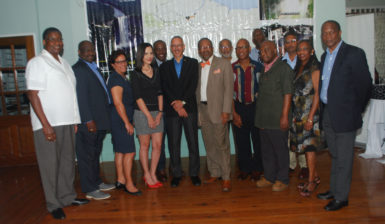A report from the Office of the Vice Chancellor on an ongoing feasibility study for the establishment of a School of Entrepreneurship and Business Innovation at the University of Guyana has declared that the realization of this goal will effectively lead to the closure of “one of the major gaps in UG’s educational platform.”
The creation of a School of Entrepreneurship and Business Education is one of a number of initiatives being spearheaded by Vice Chancellor Professor Ivelaw Griffith aimed at adding value to the institution. The business school initiative is part of what the recently appointed Vice Chancellor says is a wider plan to significantly add value to an institution which, over the years, has been plagued by political controversy, serious underfunding and student grouses associated with, among other things, serious deficiencies in resources associated with the advancement of their intellectual welfare.

The creation of a School of Entrepreneurship and Business Education is widely regarded as long overdue at UG and has been welcomed by private sector leaders in the light of concerns they have expressed over a scarcity of the varied skills that are necessary to meet the needs of the business community. Attempts to fill the scarce skills gap in the private sector have relied heavily on various other initiatives, including private sector in-house training, though business leaders have conceded that these have been insufficient to meet what, frequently, are the requirement levels of the sector.
“If businesses are to be successful and enhance current operations then there needs to be a place where the appropriate training and best practices can occur… Thus, a business school would provide training and exposure that goes beyond what is available through institutions such as EMPRETEC and IPED that currently offer valuable non-degree training programmes in business areas and the various offshore business schools where the cost of instruction is not matched by the quality of that instruction,” the report says. It is a sentiment that has been expressed in different ways by business executives who have had to endure the crippling effects of the combination of a sustained brain drain and the difficulties associated with replacing lost skills at affordable incentive packages.
Vice Chancellor Griffith’s initiative to render the university more responsive to the country’s skills needs coincides with the promulgation of the Ministry of Business’ Five-Year Development Plan which makes no secret of the fact that the public sector too is desperately in need of personnel with skills which a School of Business Education and Entrepreneurship can provide. Among the critical skills needs outlined in the Ministry of Business’ plan are those necessary to significantly improve the effectiveness of the critical Guyana Office for Investment, the state-run entity charged with the twin responsibilities of facilitating both local and overseas-based investors as well as supporting the promotion of locally produced goods on the international market.
Key to the overall strategy being employed by Vice Chancellor Griffith to drive the rehabilitative initiative at UG is a plan to draw on the intellectual resources of Guyanese in the diaspora. Accordingly, the Feasibility Study Team which held the first of what is intended to be several “technology-mediated consultations at UG” includes a number of diaspora academics among whom are Dean of the School of Business at Clark Atlanta University, Dr Edward Davis; President, Haynes Inc Floyd Haynes; Vice President, Manchester Trade International Business Advisors, Dr David Lewis; Associate Professor of Business, Morgan State University, Dr Leyland Lucas; Executive Editor the (New York-based) Network Journal, Provost Emeritus, University of Maryland, Eastern Shore, Dr Patrick Liverpool and Distinguished Professor, Clark Atlanta University, Dr Ivor Mitchell.
In 2009, UG had engaged private sector officials to discuss a proposal mooted by the Guyana Manufacturers and Services Association for the creation of a school of business at UG. At the time the business sector was advocating that the proposed new faculty offer degree courses in Human Resource Management, Accountancy and Marketing Management as part of its curriculum. While the reasons for the failure of the initiative to bear fruit are unclear, what is known is that it coincided with a period of instability at the University of Guyana which, many believe, was undergirded by the long-standing political controversy that has plagued the institution.
With part of the strategy being employed under the current initiative being to embrace strong private sector backing, the university has been inviting inputs from a broad cross-section of local entrepreneurs. Among the participants in an October 27 forum designed to build momentum for the initiative were President of the Georgetown Chamber of Commerce and Industry (GCCI) Vishnu Doerga, Chief Executive Officer of Caribbean Container Inc Patricia Bacchus, Chief Executive Officer of Global Seafood Distributors Allison Butters-Grant, Management Consultant David Yaw, Tax and Accounting Consultant Lumumba Angoy, and Interim Dean/Director, School of Agriculture, Fisheries and Human Sciences, University of Arkansas Ed Buckner.
The report issued at the conclusion of the consultation says that the creation of a School of Entrepreneurship and Business Education should be seen “not only in terms of Guyana’s economic development but in the light of global trends that have seen economic transformations regionally, hemispherically and globally.”





